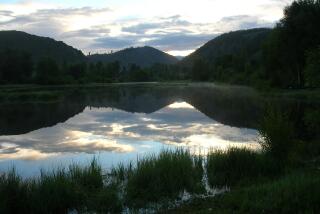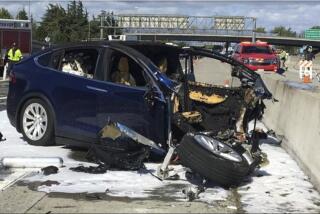Seeking Y2K Getaway, Some Head for the Hills, in Ozarks
- Share via
SPRINGDALE, Ark. — If it weren’t for the bug, F. Paul Haag could really savor the view: icy trees, misted hilltops, a fish-filled lake at his land’s edge.
But the bug is too present in the 53-year-old computer consultant’s thoughts. It keeps him busy filling propane tanks, installing generators, amassing enough grain to feed a family for two years. The bug isn’t anything endemic to this swath of the South. It’s the Y2K programming glitch preoccupying computer technicians and many others as 2000 approaches.
Last summer, it worried Haag enough for him to move from Sacramento to this breathtaking mountaintop, where he thinks he may soon need to live off the land. “It’s not a question of if, it’s just a matter of how bad,” Haag says of the Y2K bug’s potential for disruption. “It’s not unwise to be prudent.”
Across the country, small but noticeable clumps of migrants, the far end of Y2K worriers, are relocating to remote areas. No place may be as ready for them as northwest Arkansas.
With cheap land, abundant water and isolated hills and hollows, the Ozarks have long sheltered the culture’s refugees. Frank and Jesse James holed up here in the 19th century; veterans from battle-scarred Tennessee straggled in after the Civil War. In the 1960s, it was the back-to-earthers, or “tick hippies” as locals called them. And in the 1980s came Midwestern retirees and alarming groups of armed, right-wing extremists.
Now the newcomers include Y2Kers, usually wanting 5 to 40 acres, natural water, land pocked with caves. Like earlier survivalists, they’re often devout, with apocalyptic notions. Many are also highly educated.
“My clients are mostly businesspeople,” said Nathan Parker, who is helping Haag ready his property.
“Almost all of them have money or access to money,” added Parker, who is also preparing 16 large properties and about a dozen small farms in the area. “Right off the cuff, I’d say everybody I’m working for has college or advanced degrees.”
Stockpiling Watched With Amusement
Longtime residents watch such building, digging and stockpiling with bemusement. Some, like Parker, are used to survivalist living themselves and find work helping Y2Kers. Others, like the ex-hippies who still people these hills, shake their heads at the extravagant take on self-sufficiency.
If the new year dawns tranquilly, migrants often say they’ll enjoy the Arkansas Ozarks anyhow. Home to poultry behemoth Tyson Foods Inc., and the Wal-Mart empire, the region has boomed in recent years. Composed of four counties bordered by Oklahoma on the west and Missouri on the north, the area’s rolling mountains--technically, plateaus--and verdant meadows belie the fast growth in its cities.
A mind-your-own-business kind of place, the Ozarks can absorb plenty of newcomers, Bud Baker, 63, said one recent morning at Daylight Donuts in West Fork. But he and his friends do laugh a bit at Y2Kers over their crullers.
“This one guy out here, he’s got him some big tanks filled with diesel and a big water pond,” said Baker’s friend Henry Cantrel, a 67-year-old retired carpenter. “They think they’re going to raise their own food. They’ll last a year, then they’ll go back to California to make more money.”
Millenarians Arrive in Handfuls
Although the millenarians have got their new neighbors’ attention, they’re arriving in handfuls, not throngs. Nick Masullo, manager of the Ozark Cooperative Warehouse, calculates they’ve nudged sales up 15%. While some real estate agents report no change in business, many report up to a half-dozen clients in recent months. One Fayetteville, Ark., real estate agent, Sally Erbe, said she’s closed deals on 12 Y2K properties--all, she noted gaily, in cash.
“They’re not giving up their lifestyles or their homes,” she said. “It’s mostly people who are looking for insurance,” she said.
Their concerns spring from a grievous flaw in computer history. Because early programmers indicated dates with two digits, not four, much computerized equipment, ranging from VCRs to military gear, may read 2000 as 1900.
Government agencies, utilities and many big businesses have launched or completed extensive corrective programs. But lack of consensus on what will happen at year’s end, mixed with some religious beliefs, have fed a murky subculture of worst-case prophets. Their most common forum, for now: the Internet. Among their darkest predictions: the collapse of the power grid, leading to shortages of food and money supplies, unleashing urban anarchy.
Not all Y2K settlers see biblical meaning in the computer malfunction. Much scuttlebutt here concerns newcomers from the heart of the beast: the computer industry.
In Madison County, locals buzz about the arrival of a Microsoft Corp. executive. Like many newcomers to the area, the man, who bought 155 acres of creek-fed land, expressed irritation at media prying.
“The press is crucifying everyone who is preparing for Y2K, and I’m not prepared to be crucified. Sorry,” he said, before hanging up the phone.
But computer consultant Haag was happy to talk. Though he’s religious, his concerns are strictly technological, and he doesn’t expect society to unravel. But he began to take Y2K seriously after his own research, which included the work of Y2K pundit Gary North.
The Arkansas-based North, who declines interviews, has prompted much of the Y2K influx to the region. Presiding over a vast Internet system, North is a religious “reconstructionist” who thinks society must collapse before Jesus Christ returns.
Northwest Arkansas, with its natural resources, University of Arkansas library and low crime rate, is an ideal place to prepare for the expected cataclysm, North writes. Last summer, he announced he was leaving his aerie for more land elsewhere in the region. Haag visited the property and snapped it up for $160,000.
In Haag’s view, nuclear power plants will be among the first hit by microchip failures. An energy crisis, he thinks, could halt transportation and food distribution and spark desperation.
Pacing his mountaintop, Haag outlined his preparations with a cane. Already, the snug, wide-windowed one-story house has been converted to use mostly propane. In the yard stood three 1,000-gallon tanks of propane and three tanks of diesel. A divorced father of three adults, Haag said he’s planning accommodations for the whole family.
Still to come are solar panels, a garden, goats and perhaps more of the weapons he collects. Haag intends them mostly for barter, but he’s also learning to shoot.
Soft-spoken and thoughtful, Haag, who has a master’s degree in political science, said he worries about Y2K extremists. “There are militants among us. Most of us, most of the Y2Kers, have a lot of arms,” Haag said as light snow began to fall. “I think this is a romanticized attempt [for some] to go back to America’s religious roots.”
To Bob Rutz, who bought 700 acres of land two years ago, social breakdown looks likely. “The stuff that’s fixing to happen--if you don’t know God real well, you’re not in real good shape wherever you are,” the engineer from Irvine, Calif., said.
Rutz, selling three-acre lots for $25,000, as well as cheaper mobile-home sites, wouldn’t say how many buyers he’s had. But his vision for the land includes a buggy factory, hospital, goatherd and airstrip.
Declining to let a reporter visit, he did volunteer, “If you have people that would like to come to a safer place than where they’re living now, with the idea of Christian ministry to the people who are going to be badly hurt . . . you can even use my phone number,” listed in the local directory. “We want to help folks.”
The out-of-towners’ hunker-down ethic is also touching the natives.
Y2K foreman Parker, a former farm supply dealer, began helping millenarians a year ago. He learned his trade, he said, simply by being an Arkansan in the depressed 1970s.
“Things were just really, really tough,” Parker said. “We gardened and we canned, and we lived and did things very primitively. It kind of set the stage for the rest of my life.”
Carolyn Green, owner of the Garden of Eve spa in Eureka Springs, also offers Y2K services. Part of a bohemian influx to this old tourist town a generation ago, Green now peddles $75-an-hour survival classes on the Internet.
“I knew there would be global [problems] one day,” she said, “but we didn’t put the Y2K name to it.”
At the Ozark warehouse, Masullo also has been at work, making the distribution system Y2K-safe. But he disapproves of panic-buying of unwieldy parcels of food. He did like a local newspaper headline, “Disciples of Doom,” and thinks it’s a good name for his bowling team.
From their hand-built house on a steep hill in Kingston, meanwhile, back-to-earthers Barbara and Derrick Zimmerer regard their aloof new Y2K neighbors with goodwill and skepticism.
“This area throws out 75% of the people who come here,” mused Barbara. She and Derrick bought land here in 1976, nature-loving hippies repulsed by bureaucracies and happy to do without plumbing.
Unlike their hippie neighbors who were eventually driven out by unemployment and isolation, the Zimmerers found a life here as adults. They know the locals. They grow organic vegetables, eat pork slaughtered by a neighbor and barter labor with friends. They also depend on the outside world, earning part of their income from Way Out Salvage, an Internet-based Volkswagen parts company.
Perched by her wood stove as snow started to turn the air white, Barbara Zimmerer said: “These new people are coming for the right reasons. It’s beautiful to be outside working where you don’t have sirens, people coming door to door.”
But, she added, Y2Kers may not fully appreciate the grit it takes to live in this way. “Moving here is easy. Being able to stay here and take care of yourself is a whole lot harder.”
More to Read
Sign up for The Wild
We’ll help you find the best places to hike, bike and run, as well as the perfect silent spots for meditation and yoga.
You may occasionally receive promotional content from the Los Angeles Times.






